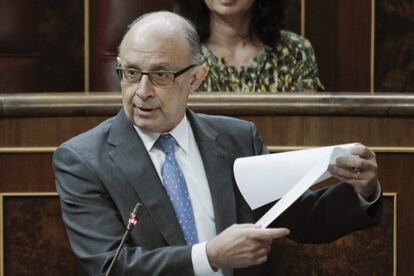Finance Minister defies official figures and claims Spaniards’ wages aren’t falling
Montoro insists there has merely been moderation in pay increases

Flying in the face of official figures and comments by his own political boss, Finance Minister Cristóbal Montoro on Wednesday declared that wages in Spain were not falling.
“Salaries are not falling, they’re only moderating their growth,” Montoro said in Congress in response to a question by the coordinator of the Plural Left group, Cayo Lara. “It’s not the same to fall as to moderate grow,” he insisted.
The latest Quarterly Labor Cost Survey for the second quarter compiled by the National Statistics Institute (INE) showed an annual fall in wages of 0.6 percent. Wages have fallen for the last three quarters in a row. The INE’s National Accounts figures also show that remunerations per worker have been falling since 2012. A recent report by the research department of savings bank La Caixa indicated that real wages (after taking into account the impact of inflation) have fallen 7 percent since 2010.
Lara reminded Montoro of remarks by Prime Minister Mariano Rajoy during an official visit to Japan a week ago in which he pointed out to potential Japanese investors that unit labor costs - the labor cost per unit of output - in Spain are falling.
After the debate in Congress, Montoro later explained in the corridors of parliament that he was referring to data from collective bargaining agreements compiled by the Labor Ministry, which showed that salaries rose an average 0.56 percent in accords signed in the first nine months of the year. However, those agreements cover only 3.7 million wage earners, 27 percent of the total in the country. Even then, taking into account inflation, which is expected to end this year at a little under 1 percent, the 0.56-percent hike amounts to a fall in real wages.
Montoro’s assertion also belies the increase in exports Spain has enjoyed as a result of increased competiveness deriving precisely from lower unit labor costs. The finance minister on Wednesday also linked “excessive” wage demands at the start of the crisis for the subsequent massive destruction of jobs.
However, as La Caixa’s report points out, the fall in wages has not been accompanied by an increase in hiring but quite the opposite, with the number of people out of work currently just under six million, equivalent to a jobless rate of 26.3 percent.
A report by the Bank of Spain last month linked falling wages to a draconian labor reform introduced by the Rajoy administration in February of last year.
Montoro also insisted that wage moderation was “compatible” with increased spending power.
Tu suscripción se está usando en otro dispositivo
¿Quieres añadir otro usuario a tu suscripción?
Si continúas leyendo en este dispositivo, no se podrá leer en el otro.
FlechaTu suscripción se está usando en otro dispositivo y solo puedes acceder a EL PAÍS desde un dispositivo a la vez.
Si quieres compartir tu cuenta, cambia tu suscripción a la modalidad Premium, así podrás añadir otro usuario. Cada uno accederá con su propia cuenta de email, lo que os permitirá personalizar vuestra experiencia en EL PAÍS.
¿Tienes una suscripción de empresa? Accede aquí para contratar más cuentas.
En el caso de no saber quién está usando tu cuenta, te recomendamos cambiar tu contraseña aquí.
Si decides continuar compartiendo tu cuenta, este mensaje se mostrará en tu dispositivo y en el de la otra persona que está usando tu cuenta de forma indefinida, afectando a tu experiencia de lectura. Puedes consultar aquí los términos y condiciones de la suscripción digital.








































